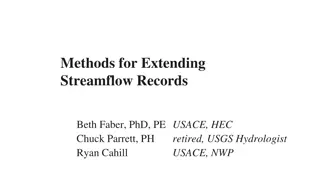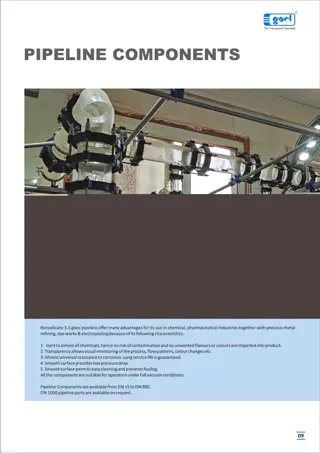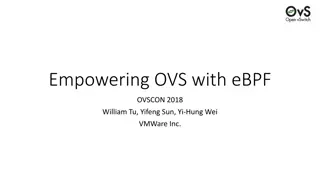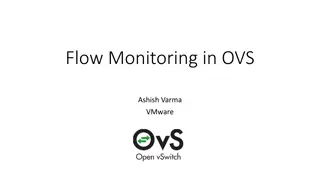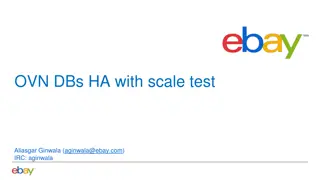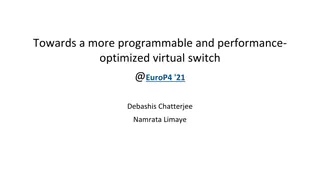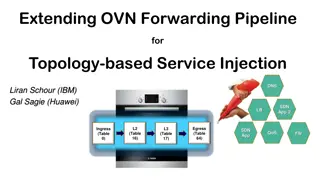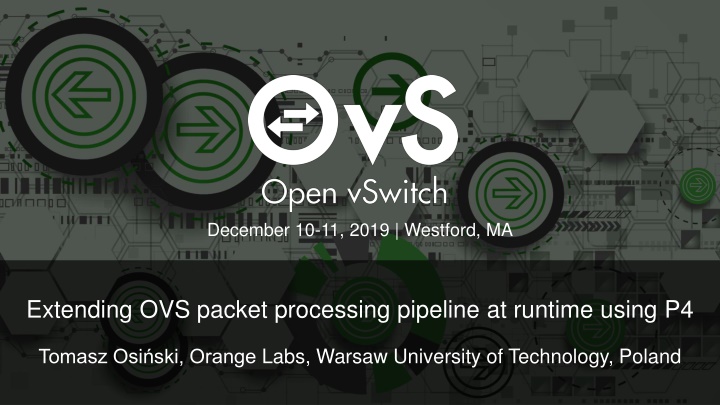
Runtime Extending OVS Packet Processing Pipeline using P4
Explore the innovative approach of extending Open vSwitch packet processing pipeline at runtime using P4, a high-level programming language for network data plane expressiveness and programmability. Discover the main contributions, motivation for VNF offloading, related work, and the architecture model of p4c-ubpf compiler tailored to Open vSwitch with stateful operations.
Download Presentation

Please find below an Image/Link to download the presentation.
The content on the website is provided AS IS for your information and personal use only. It may not be sold, licensed, or shared on other websites without obtaining consent from the author. If you encounter any issues during the download, it is possible that the publisher has removed the file from their server.
You are allowed to download the files provided on this website for personal or commercial use, subject to the condition that they are used lawfully. All files are the property of their respective owners.
The content on the website is provided AS IS for your information and personal use only. It may not be sold, licensed, or shared on other websites without obtaining consent from the author.
E N D
Presentation Transcript
December 10-11, 2019 | Westford, MA Extending OVS packet processing pipeline at runtime using P4 Tomasz Osi ski, Orange Labs, Warsaw University of Technology, Poland
Main contributions Design and implementation of programmable actions as BPF programs inside Open vSwitch (based on Oko [1]) P4c-uBPF a new P4 compiler s backend [1] Paul Chaignon et al. 2018. Oko: Extending Open vSwitch with Stateful Filters. In Proceedings of the Symposium on SDN Research (SOSR 18). 13:1 13:13.
Motivation VNF offloading using P4 P4 high-level programming language for network data plane expressivness protocol-independence target-independence VNF s data plane can be effectively described in P4 and offloaded to the high-performance targets The need for runtime programmability!
From programmable filters to programmable actions.. Oko implements stateful packets filters.. uBPF integrated with userspace datapath Integrated with flow caching architecture BPF verifier Re-design of Oko: BPF verifier modified to allow for packet writes BPF program as separate OVS action Programmable actions: New functionality logically isolated Flow caching not affected Minimal impact on the OVS forwarding pipeline
Introduction to p4c-ubpf Generates BPF bytecode: P416-> C -> uBPF [1] Based on p4c-ebpf (similar to p4c-xdp) uBPF vs. eBPF Userspace vs. Kernel Apache 2.0 vs. GPL license uBPF implements thin BPF VM (e.g. no tail calls) BPF maps used to implemented P4 tables, registers, etc. [1] Paul Chaignon et al. 2018. Oko: Extending Open vSwitch with Stateful Filters. In Proceedings of the Symposium on SDN Research (SOSR 18). 13:1 13:13.
p4c-ubpf: architecture model Tailored to Open vSwitch No packet forwarding! No access to ingress / egress port Simple PASS/DROP Support for P4 registers Stateful operations
Basic uBPF program structure static inline bpf_result ubpf_handle_packet(struct ubpf_vm *vm, struct dp_packet *packet) { uint64_t ret = vm->jitted(packet, pkt_len); return (ret == 1)? BPF_MATCH // pass : BPF_NO_MATCH; // drop } uint64_t entry(struct dp_packet *ctx, uint64_t pkt_len) { uint8_t pass = 1; void *pkt = ubpf_packet_data(ctx); /* Packet processing logic */ /* Parser */ /* Control block (Match+Action) */ /* Deparser */ void * ubpf_packet_data(void *ctx) { struct dp_packet *packet = (struct dp_packet *) ctx; returndp_packet_data(packet); } return pass; }
P4 Headers headerEthernet_h { bit<48> dstAddr; bit<48> srcAddr; bit<16> etherType; } struct Ethernet_h{ uint64_t dstAddr; /* bit<48> */ uint64_t srcAddr; /* bit<48> */ uint16_t etherType; /* bit<16> */ uint8_t ebpf_valid; }; struct mpls_h { uint32_t label; /* bit<20> */ uint8_t tc; /* bit<3> */ uint8_t stack; /* bit<1> */ uint8_t ttl; /* bit<8> */ uint8_t ebpf_valid; }; header mpls_h { bit<20> label; bit<3> tc; bit<1> stack; bit<8> ttl; } p4c- ubpf
P4 Parser struct Headers_t headers = { .ethernet = { .ebpf_valid = 0 }, .mpls = { .ebpf_valid = 0 }, .ipv4 = { .ebpf_valid = 0 }, }; goto start; start: { headers.ethernet.dstAddr = load_dword(pkt, ); headers.ethernet.ebpf_valid = 1; switch (headers.ethernet.etherType) { case 0x0800: goto ipv4; case 0x8847: goto mpls; default: goto accept; } } accept: { /* Control block */ } parser prs( ) { statestart { packet.extract(headers.ethernet); transition select(headers.ethernet.etherType) { 16w0x800 : parse_ipv4; 0x8847 : parse_mpls; default : accept; } } state parse_mpls { packet.extract(headers.mpls); transition ipv4; // simplified } state parse_ipv4 { packet.extract(headers.ipv4); transition accept; } } p4c- ubpf
Match-Action Tables /* construct key */ struct pipe_downstream_tbl_key key = {}; key.headers_ipv4_dstAddr = headers.ipv4.dstAddr; /* value */ struct pipe_downstream_tbl_value *value = NULL; /* perform lookup */ value = ubpf_map_lookup(&pipe_downstream_tbl, &key); action ipv4_decrementl_ttl() { headers.ipv4.ttl = headers.ivp4.ttl - 1; } table downstream_tbl{ key = { headers.ipv4.dstAddr : exact; } actions = { ipv4_decrement_ttl; NoAction; } } if (value != NULL) { /* run action */ switch (value->action) { case pipe_ipv4_decrement_ttl: { headers.ipv4.ttl = (headers.ipv4.ttl + 255); } } } p4c- ubpf apply { downstream_tbl.apply(); }
P4 Registers // map definition struct ubpf_map_def count_r_0 = { .type = UBPF_MAP_TYPE_HASHMAP, .key_size = sizeof(uint32_t), .value_size = sizeof(uint32_t), .max_entries = 1, .nb_hash_functions = 0, }; uint32_t idx = 0; uint32_t* tmp = ubpf_map_lookup(&count_r_0, &idx); if (tmp != NULL) { uint32_t tmp_value = (*tmp + 1); ubpf_map_update(&count_r_0, &idx, &tmp_value); } Register<bit<32>, bit<32>>(1) count_r; apply { bit<32> index = 0; bit<32> last_count = count_r.read(index); count_r.write(index, last_count + 1); } p4c- ubpf
P4 Deparser int packetOffsetInBits = 0; if (headers.ethernet.ebpf_valid) { ebpf_byte = ((char*)(&headers.ethernet.dstAddr))[0]; write_byte(pkt, BYTES(packetOffsetInBits) + 0, control dprs(packet_out packet, in Headers_t headers) { apply { packet.emit(headers.ethernet); packet.emit(headers.ipv4); } } (ebpf_byte)); packetOffsetInBits += 48; p4c- ubpf } if (headers.ipv4.ebpf_valid) { } return pass;
Arbitrary packet encapsulation void * ubpf_adjust_head(void* ctx, int offset) { struct dp_packet *packet = (struct dp_packet *) ctx; void *pkt = NULL; if (offset >= 0) // encapsulation pkt = dp_packet_push_zeros(packet, offset); else { // decapsulation dp_packet_reset_packet(packet, abs(offset)); pkt = dp_packet_data(packet); } return pkt; } action mpls_encap() { headers.mpls.setValid(); headers.ethernet.etherType = 0x8847; headers.mpls.label = 20; headers.mpls.tc = 5; headers.mpls.stack = 1; headers.mpls.ttl= 64; } action mpls_decap() { headers.mpls.setInvalid(); } /* control block */ case pipe_mpls_encap: { head_len += 4; // sizeof(mpls_h) headers.mpls.ebpf_valid = true; } case pipe_mpls_decap: { head_len -= 4; // sizeof(mpls_h) headers.mpls.ebpf_valid = false; } /* deparser */ pkt = ubpf_adjust_head(ctx, head_len); if (headers.mpls.ebpf_valid) { write_byte( ); } return pass; control dprs(packet_out packet, in Headers_t headers) { apply { packet.emit(headers.ethernet); packet.emit(headers.mpls); packet.emit(headers.ipv4); } } p4c- ubpf
Programming workflow #include <ubpf_model.p4> parser Parser() { } control pipe() { action NoAction() { } action rewrite_ipv4(bit<32> srcAddr) { hdr.ipv4.srcAddr = srcAddr }; table nat_tbl { key = { hdr.ipv4.srcAddr : exact } actions = { NoAction; rewrite_ipv4; } apply { nat_tbl.apply() } } } control Deparser() { } ubpf(Parser(), pipe(), Deparser()) main; p4c-ubpf -o prog.c nat.p4 clang -O2 target bpf -c prog.c -o prog.o SDE ovs-ofctl load-bpf-prog br0 <prog-id> prog.o ovs-ofctl add-flow br0 in_port=1,actions=prog:<prog-id>, \ output:2 ovs-ofctl update-bpf-map br0 <prog-id> <map-id> \ key 16 0 12 172 value 0 0 0 1 192 168 1 1 ovs-ofctl dump-bpf-map br0 <prog-id> <map-id> Open vSwitch ovs-ofctl delete-bpf-map br0 <prog-id> <map-id> key 16 0 12 172 ovs-ofctl unload-bpf-map br0 <prog-id> nat.p4
Programming workflow #include <ubpf_model.p4> parser Parser() { } control pipe() { action NoAction() { } action rewrite_ipv4(bit<32> srcAddr) { hdr.ipv4.srcAddr = srcAddr }; table nat_tbl { key = { hdr.ipv4.srcAddr : exact } actions = { NoAction; rewrite_ipv4; } apply { nat_tbl.apply() } } } control Deparser() { } ubpf(Parser(), pipe(), Deparser()) main; p4c-ubpf -o prog.c nat.p4 clang -O2 target bpf -c prog.c -o prog.o SDE ovs-ofctl load-bpf-prog br0 <prog-id> prog.o ovs-ofctl add-flow br0 in_port=1,actions=prog:<prog-id>, \ output:2 ovs-ofctl update-bpf-map br0 <prog-id> <map-id> \ key 16 0 12 172 value 0 0 0 1 192 168 1 1 ovs-ofctl dump-bpf-map br0 <prog-id> <map-id> Open vSwitch ovs-ofctl delete-bpf-map br0 <prog-id> <map-id> key 16 0 12 172 ovs-ofctl unload-bpf-map br0 <prog-id> nat.p4
Programming workflow #include <ubpf_model.p4> parser Parser() { } control pipe() { action NoAction() { } action rewrite_ipv4(bit<32> srcAddr) { hdr.ipv4.srcAddr = srcAddr }; table nat_tbl { key = { hdr.ipv4.srcAddr : exact } actions = { NoAction; rewrite_ipv4; } apply { nat_tbl.apply() } } } control Deparser() { } ubpf(Parser(), pipe(), Deparser()) main; p4c-ubpf -o prog.c nat.p4 clang -O2 target bpf -c prog.c -o prog.o SDE ovs-ofctl load-bpf-prog br0 <prog-id> prog.o ovs-ofctl add-flow br0 in_port=1,actions=prog:<prog-id>, \ output:2 ovs-ofctl update-bpf-map br0 <prog-id> <map-id> \ key 16 0 12 172 value 0 0 0 1 192 168 1 1 ovs-ofctl dump-bpf-map br0 <prog-id> <map-id> Open vSwitch ovs-ofctl delete-bpf-map br0 <prog-id> <map-id> key 16 0 12 172 ovs-ofctl unload-bpf-map br0 <prog-id> nat.p4
Programming workflow #include <ubpf_model.p4> parser Parser() { } control pipe() { action NoAction() { } action rewrite_ipv4(bit<32> srcAddr) { hdr.ipv4.srcAddr = srcAddr }; table nat_tbl { key = { hdr.ipv4.srcAddr : exact } actions = { NoAction; // index 0 rewrite_ipv4; } // index 1 apply { nat_tbl.apply() } } } control Deparser() { } ubpf(Parser(), pipe(), Deparser()) main; p4c-ubpf -o prog.c nat.p4 clang -O2 target bpf -c prog.c -o prog.o SDE ovs-ofctl load-bpf-prog br0 <prog-id> prog.o ovs-ofctl add-flow br0 in_port=1,actions=prog:<prog-id>, \ output:2 ovs-ofctl update-bpf-map br0 <prog-id> <map-id> \ key 16 0 12 172 value 0 0 0 1 192 168 1 1 ovs-ofctl dump-bpf-map br0 <prog-id> <map-id> Open vSwitch ovs-ofctl delete-bpf-map br0 <prog-id> <map-id> key 16 0 12 172 ovs-ofctl unload-bpf-map br0 <prog-id> nat.p4
Programming workflow #include <ubpf_model.p4> parser Parser() { } control pipe() { action NoAction() { } action rewrite_ipv4(bit<32> srcAddr) { hdr.ipv4.srcAddr = srcAddr }; table nat_tbl { key = { hdr.ipv4.srcAddr : exact } actions = { NoAction; // index 0 rewrite_ipv4; } // index 1 apply { nat_tbl.apply() } } } control Deparser() { } ubpf(Parser(), pipe(), Deparser()) main; p4c-ubpf -o prog.c nat.p4 clang -O2 target bpf -c prog.c -o prog.o SDE ovs-ofctl load-bpf-prog br0 <prog-id> prog.o ovs-ofctl add-flow br0 in_port=1,actions=prog:<prog-id>, \ output:2 ovs-ofctl update-bpf-map br0 <prog-id> <map-id> \ key 16 0 12 172 value 0 0 0 1 192 168 1 1 ovs-ofctl dump-bpf-map br0 <prog-id> <map-id> Open vSwitch ovs-ofctl delete-bpf-map br0 <prog-id> <map-id> key 16 0 12 172 ovs-ofctl unload-bpf-map br0 <prog-id> nat.p4
Programming workflow #include <ubpf_model.p4> parser Parser() { } control pipe() { action NoAction() { } action rewrite_ipv4(bit<32> srcAddr) { hdr.ipv4.srcAddr = srcAddr }; table nat_tbl { key = { hdr.ipv4.srcAddr : exact } actions = { NoAction; // index 0 rewrite_ipv4; } // index 1 apply { nat_tbl.apply() } } } control Deparser() { } ubpf(Parser(), pipe(), Deparser()) main; p4c-ubpf -o prog.c nat.p4 clang -O2 target bpf -c prog.c -o prog.o SDE ovs-ofctl load-bpf-prog br0 <prog-id> prog.o ovs-ofctl add-flow br0 in_port=1,actions=prog:<prog-id>, \ output:2 ovs-ofctl update-bpf-map br0 <prog-id> <map-id> \ key 16 0 12 172 value 0 0 0 1 192 168 1 1 ovs-ofctl dump-bpf-map br0 <prog-id> <map-id> Open vSwitch ovs-ofctl delete-bpf-map br0 <prog-id> <map-id> \ key 16 0 12 172 ovs-ofctl unload-bpf-map br0 <prog-id> nat.p4
Programming workflow #include <ubpf_model.p4> parser Parser() { } control pipe() { action NoAction() { } action rewrite_ipv4(bit<32> srcAddr) { hdr.ipv4.srcAddr = srcAddr }; table nat_tbl { key = { hdr.ipv4.srcAddr : exact } actions = { NoAction; // index 0 rewrite_ipv4; } // index 1 apply { nat_tbl.apply() } } } control Deparser() { } ubpf(Parser(), pipe(), Deparser()) main; p4c-ubpf -o prog.c nat.p4 clang -O2 target bpf -c prog.c -o prog.o SDE ovs-ofctl load-bpf-prog br0 <prog-id> prog.o ovs-ofctl add-flow br0 in_port=1,actions=prog:<prog-id>, \ output:2 ovs-ofctl update-bpf-map br0 <prog-id> <map-id> \ key 16 0 12 172 value 0 0 0 1 192 168 1 1 ovs-ofctl dump-bpf-map br0 <prog-id> <map-id> Open vSwitch ovs-ofctl delete-bpf-map br0 <prog-id> <map-id> \ key 16 0 12 172 ovs-ofctl unload-bpf-prog br0 <prog-id> nat.p4
Use cases Domain-specific network protocols GPRS Tunnelling Protocol (GTP)* Point-to-Point Protocol over Ethernet (PPPoE) In-Band Network Telemetry (INT) Stateful data plane programs Stateful firewall In-Network DDoS mitigation Many others.. creativity is the limit! * PoC ~200 lines of P4 code
Summary We propose a hybrid approach Keep well-known features and backward compatibility of OVS Add BPF as OVS action and P4-based programmability Many new, exciting use cases for OVS! The p4c-ubpf compiler to be merged with p4c Work in progress: Enhancements to BPF verifier Checksum computation Performance optimizations We plan to open-source OVS modifications soon!
Thank you! osinstom@gmail.com / tomasz.osinski2@orange.com
Topology Service Injection 2.0 The plugin for OpenStack Neutron proposed a few years ago.. Goal: allow users/tenants to inject vendor-specific network functions in the virtual networking layer of OpenStack TSI 2.0: P4 & P4Runtime as a default southbound interface Enhance programmability to SmartNiCs and ToR switches
Open issues Stack size limit (512 bytes): Complex parsers are rejected by the verifier due to small stack size! Solution: As we re in userspace -> change stack size (needed modifications to clang) Recirculate or not to recirculate? Refer to: P. Chaignon, Open vSwitch Extensions with BPF , Open vSwitch 2018 Fall Conference
p4c-ubpf: architecture model No packet forwarding! No access to ingress / egress port Simple PASS/DROP Support for P4 registers Stateful operations extern void mark_to_drop(); extern void mark_to_pass(); parser parse<H, M>(packet_in packet, out H headers,inout M meta); control pipe<H, M>(inout H headers, inout M meta); @deparser control deparser<H>(packet_out b, in H headers); package ubpf<H, M>(parse<H, M> prs, pipe<H, M> p, deparser<H> dprs); extern Register<T, S> { Register(bit<32> size); T read (in S index); void write (in S index, in T value); }



